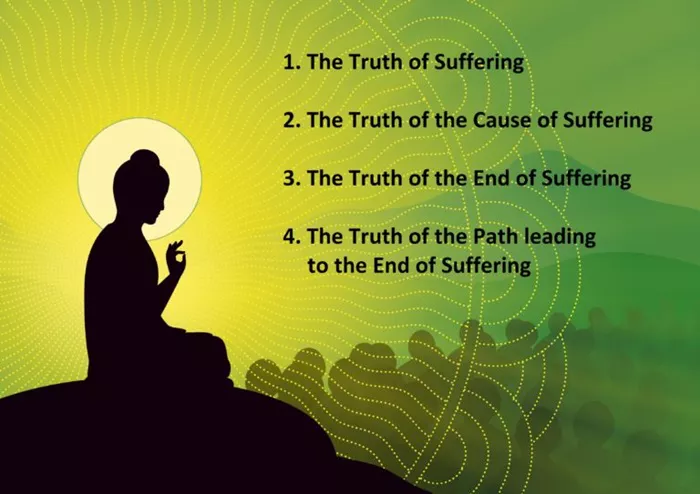The Four Noble Truths are the foundation of Theravada Buddhism. They were taught by the Buddha more than 2,500 years ago. These truths explain why we suffer and how we can end suffering. They are simple but very deep. Understanding them is the key to wisdom and peace in life.
Theravada Buddhism focuses on the original teachings of the Buddha. It is often called the “Teaching of the Elders.” This tradition believes in personal effort to reach enlightenment. To truly understand Theravada Buddhism meaning, we must look closely at the Four Noble Truths.
The First Noble Truth: The Truth of Suffering (Dukkha)
Understanding Dukkha
The first truth is that life is full of suffering. This does not mean life is always bad. It means there is pain, worry, and sadness in life. We get sick, we grow old, and we die. We lose things we love. We want things but cannot always have them. Even happy moments do not last forever. This is what Buddhists call “dukkha.”
Suffering is part of life. We suffer because life always changes. We suffer because we cling to things. We want to keep good things and avoid bad things. But everything changes, so we feel stress and sadness.
Three Types of Suffering
- Ordinary Suffering – This includes physical pain, sadness, and disappointment.
- Suffering from Change – Even good things bring pain when they end.
- Suffering from Attachment – Wanting things to stay the same causes suffering.
The Second Noble Truth: The Cause of Suffering (Samudaya)
The Root of Suffering is Desire
The second truth explains why we suffer. The Buddha said the cause of suffering is “tanha,” or craving. We want things. We want to feel good. We want love, money, praise, and success. But wanting too much brings pain.
This craving has three forms:
- Craving for Pleasure – Wanting enjoyable feelings.
- Craving for Existence – Wanting to keep living or to become something.
- Craving for Non-Existence – Wanting to escape or end feelings.
Attachment and Ignorance
Desire is linked to attachment. We hold onto people, things, and ideas. We also suffer because we do not see clearly. We are ignorant of the truth. We think things will last forever. But they do not. This leads to more suffering.
The Third Noble Truth: The End of Suffering (Nirodha)
Freedom from Suffering
The third truth gives us hope. It says that we can end suffering. When we let go of craving, suffering ends. This is called “nirvana” in Buddhism. Nirvana means peace and freedom. It is not a place. It is a state of mind with no more desire or hate.
Nirvana is Possible
To reach nirvana, we must understand our desires. We must stop clinging. We must live in the present. We must train the mind to let go. When we do this, we find deep peace.
The Fourth Noble Truth: The Path to End Suffering (Magga)
The Noble Eightfold Path
The fourth truth shows us the way. It is called the Noble Eightfold Path. This path is like a guide. It has eight parts. They are not steps to finish one by one. They work together. We must practice all of them in daily life.
- Right View – Seeing life as it is. Understanding the Four Noble Truths.
- Right Intention – Thinking with kindness and compassion.
- Right Speech – Speaking truthfully. Avoiding lies, gossip, and harsh words.
- Right Action – Acting in ways that do not harm others. Being honest and kind.
- Right Livelihood – Earning a living without hurting others.
- Right Effort – Trying to do good. Avoiding bad thoughts and actions.
- Right Mindfulness – Being aware of thoughts, feelings, and surroundings.
- Right Concentration – Focusing the mind. Practicing meditation.
Living the Path
Practicing the path takes time. It needs patience and effort. But each step helps us live with more wisdom and peace. It helps reduce suffering. Over time, it can lead to enlightenment.
How the Four Noble Truths Are Practiced in Theravada Buddhism
Daily Reflection
In Theravada Buddhism beliefs, the Four Noble Truths are reflected on daily. Monks and lay people both try to apply them. They meditate to see the truth more clearly. They follow the precepts to avoid harm. They study the Buddha’s teachings. All of this helps reduce suffering.
Role in Meditation
Meditation is very important in Theravada Buddhism. Mindfulness and concentration help one see desire and suffering clearly. Through deep meditation, a person can reach insight. This insight shows the way to let go of craving and reach peace.
Ethical Living
Living by the Eightfold Path also means living ethically. Theravada Buddhists follow the Five Precepts:
- Do not kill.
- Do not steal.
- Do not lie.
- Do not commit sexual misconduct.
- Do not take drugs or alcohol.
Following these precepts supports the path to enlightenment.
The Four Noble Truths and Modern Life
Why These Teachings Still Matter
Many people today still find truth in these teachings. Even with modern life’s changes, people suffer. They feel stress, sadness, and worry. The Four Noble Truths help us understand why. They also help us find peace.
Practical Use in Daily Life
You can use these teachings every day. Notice when you are craving something. Ask if it brings real happiness. Practice letting go. Be kind to others. Be mindful of your actions. These small steps can bring big changes.
Conclusion
The Four Noble Truths are simple but deep. They help us understand suffering and how to end it. They are the core of Theravada Buddhism. By practicing them, we can live with more peace, wisdom, and compassion.
Whether you are new to Buddhism or have practiced for years, the Four Noble Truths are always worth reflecting on. They are not just old teachings. They are tools for freedom, here and now. May all beings be free from suffering. May all find peace on the path.

